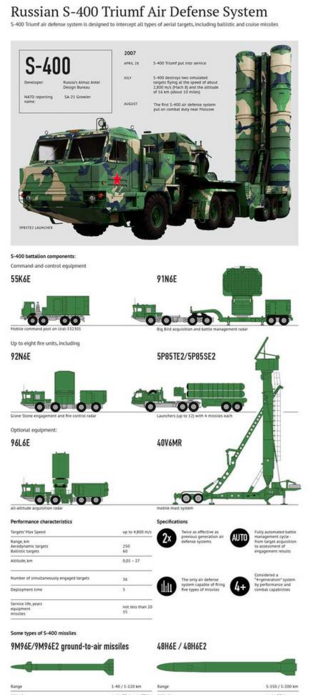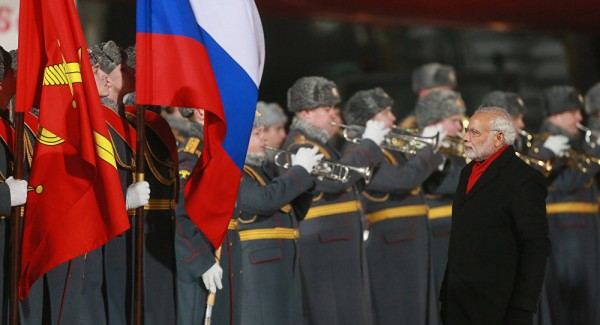Modi in Moscow – Agenda includes RD-93 engines supply to Pakistan for JF-17 Thunder fighters
By Agha Iqrar Haroon

Worried with Russian supply of RD-93 engines to Pakistan for its JF-17 Thunder fighter aircrafts, Indian Prime Minister Narendra Modi has reached Moscow to revitalize and renew Defence procurement relationship with Kremlin. His visit has an agenda to halt Russian supply of defence hardwares to Pakistan and try to lure Russia for not providing Su-35 fighter jets to Islamabad. Procurement of MI35 helicopters from Russia is also on the agenda of Pakistan that is enough to disturb India. He will also attend Indian -Russian annual Summit and a big lobbying is done in Moscow to halt Pak-Russian relationship.
According to dispatchnewsdesk.com, the JF-17 Thunder combat aircraft was jointly developed by the Pakistan Aeronautical Complex and Chengdu Aircraft Industry Corporation (PAC/CAC). Pakistan and China initiated a project for jointly developed fighter aircraft and they signed a memorandum of understanding (MoU) in 1995 for joint design and development of a new fighter. In June 1999, the contract to jointly develop and produce the Chengdu FC-1/Super 7 was signed. The project was to be a 50:50 partnership.
In 2005 China signed a $267 million contract with Russia for 100 RD-93 turbofan engines, a variant of the RD-33, to power the FC-1 Fierce Dragon fighter aircraft. Engine deliveries from Klimov and Chernyshev were to begin in 2006. It may be mentioned that the RD-93 engines is a variant of the RD-33 engine developed to power the MiG-29 fighter jet.

The RD-93 was developed by Russia’s Klimov design bureau specifically for the demands of FC-1 fighter (known in Pakistan as the JF-17 Thunder). Contract was between Russia and China with “No Resale and Re-export” clause. China went ahead and delivered two RD-93 equipped JF-17 fighters to Pakistan in March 2007 prompting India to protest the deal as a violation of the end-user agreement between Russia and China. India asked Russia to “freeze” the deal. In August 2007 Russia reportedly blocked China from re-exporting Russian RD-93 engines for Chinese-made fighters to Pakistan. Pakistan Air Force (PAF) inducted its first JF-17 squadron in February 2010 while China offered Pakistan Chinese made engines for future aircrafts. However, PAF liked performance of RD-93 Russian made engines and decided to use same engines in its production line at Kamra where it has reportedly established a full-scale servicing and overhaul facility for the Klimov/Sarkisov RD-93 engine. Now Pakistan and Russia have gone in a phase of relationship where Russia has decided to provide RD-93 directly to Pakistan. Indian Defence circle is not happy with these developments and the visit f Modi to Moscow is very important to place Moscow as an “Old Ally” while asking Russia to slow its pace of relations with Pakistan.
Indian press believes that Indo-Russian meetings will bring agreements worth $10 billion between the two countries. Indian Policy of Look West took Indian away from Russia and gap was filled with Pakistan as a new trusted friend in South Asia.
Diplomatic circles believe that Modi during his visit to Moscow will discuss several defence deals for giving a gesture to Russia that India still needs it in Defence procurement.
According to Indian Defence Analysts, announcement of purchase of five S-400 Triumf air defence systems with an estimated cost of 6 billion $ expected during Modi’s visit. India is also likely to announce the purchase of four additional improved Talwar class stealth frigates from Russia.

“Russia has the potential to be the leading partner in our Make in India mission in defence manufacturing. We are soon going to make a beginning in that direction,” said Modi in a written interview to Russian official news agency ITAR-TASS before his departure to Moscow.
Two deals for utility and medium lift helicopters are expected to be signed, including the deal for 200 Kamov-226T utility helicopters to be built in India by a private partner and a deal for 48 additional Mi-17 V5 medium lift helicopters for the Air Force. Indian Iron giant –Tata is also in an advanced stage of talks with Sukhoi to set up a Joint Venture to manufacture spares for Sukhoi fighters in India.
Analysts believe that Modi will share his mind with Russian President Vladimir Putin over Russian-Pakistan relationship and Indo-US ties. Russia is annoyed with India over postponement of a number of defence procurement contracts at final stages and Russia also believes that Indian technology has gone to a level where India is interested in reverse technology process by buying sensitive technologies from Russia.
Indian Defence Analyst P. Stobdan believes that the two (India and Russia) countries have substantially moved away from each other and the ‘buyer-seller’ defence relationship is being threatened by global competitiveness.
The pace of relations is too slow between the two countries over two joint flagship projects – the stealth Fifth-Generation Fighter Aircraft (FGFA) based on PAK-FA or Sukhoi T-50 and the Multi-Role Transport Aircraft (MTA) based on II-214.
Stobdan said in one of his research paper that Russia would be worried about ‘Make in India’ campaign and the proposed Indo-US Defence Trade and Technology Initiative (DTTI). The DTTI, in particular, seeks to go beyond a transactional defence relationship by freeing India from import dependency through co-production and co-development in several big-ticket items that are aimed at boosting India’s security and economy.
Indian Defence experts claim that top of the agenda is buying Yasen-class submarine, the newest Russian nuclear-powered multipurpose attack submarine. Based on the Akula-class submarine (like INS Chakra) and the Alfa-class submarines, it is projected to replace Russia’s Soviet-era attack submarines like the Akula and Oscar-class. The Russians began building these submarines only in 2011 and can build only one a year at the bes
The outcome of Modi visit will determine future Russian-Pak as well as Indo-Russian relationships.






